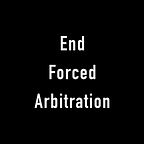Launches and Landings
Googlers for Ending Forced Arbitration appeal directly to TVC Suppliers and 2020 presidential candidates
NEW YORK, NY (May 30, 2019 at 9am EST) — Seven months ago, employees at Google sounded the alarm on a number of workers rights issues and the need for change. Our group took up the issue of ending forced arbitration with the same vigor as we would when releasing a new product. This culminated in a version 1.0 ‘launch’ in March 2019 when Google ended forced arbitration its own workers. But at Google, we don’t just measure success by launches. We measure it by landings. So we will launch and iterate until we land our goal of all workers in America having access to their civil rights.
To achieve this goal, we organized our work into three pillars: Coalitions, Education and Legislation. And today, we’re firing on all three fronts.
Coalitions. We’ve come together with fellow tech workers to appeal to Congress multiple times these past months, but today we’re addressing the suppliers of Google directly. As reported in the New York Times this week, our temp/vendor/contract (“TVC”) workforce exceeds our full-time employee workforce. Today we’re starting with the ABCs of TVCs by directly appealing to Adecco, Bon Appetit Management Company and CDI Corporation. These three companies supply thousands of workers to Silicon Valley and rake in billions of dollars in revenue, yet force their employees into arbitration. (ex: So while a worker at Adecco may no longer be subject to forced arbitration by Google, the worker is still very much forced into arbitration by Adecco itself.) As the New York Times editorial board advises, we should not and do not accept Google’s current recent policy change as success. All workers must have access to their civil rights. Read the letters to suppliers here, co-signed by Public Justice, the Center for Popular Democracy and American Association for Justice.
Education. Last Tuesday, the Economic Policy Institute published a new study about forced arbitration entitled Unchecked Corporate Power. The study predicts that “by 2024, more than 80 percent of private-sector, nonunion workers will be covered by forced arbitration clauses.” This means the next president will oversee a workforce predominantly bound by these clauses and be responsible for the enforcement agencies that investigate illegal activity in the workplace. We contacted all 25 candidates running for president and researched their positions on the topic of forced arbitration. We share those results with you on our Twitter channel @endforcedarb throughout the day — or check out our website for the full round up.
Legislation. We want to see the Forced Arbitration Injustice Repeal Act (FAIR Act, HR 1423, S.610) turn into law. With 209 sponsors in the House now, the bill has a real shot of passing in the House. But it won’t be without challenge.
Two weeks ago, the U.S. Chamber Institute for Legal Reform released a paid study entitled “Fairer, Faster, Better: An Empirical Assessment of Employment Arbitration”, along with a survey demonstrating that U.S. citizens “want to keep their access to arbitration to resolve claims.”
The survey seems as if it were designed to confuse participants. In some questions, it conflated voluntary arbitration and forced arbitration. In others, it asked respondents to choose between forced arbitration and forced lawsuits. Nobody wants to ban arbitration; employee and consumer advocates only want to prevent companies from forcing individuals to preemptively waive their right to their day in court. But these survey tactics aren’t new. This blog post from 2008 goes into great detail about how arbitration surveys like this one have long misled both their participants and readers. A more accurate measurement of Americans’ views on forced arbitration can be found at bit.ly/HartStudy, which finds that 84% of respondents across the political spectrum believe that arbitration should be voluntary, not mandatory.
Meanwhile, the paid study claims to prove that arbitration is superior to legislation, but it actually shows how powerfully forced arbitration works as a tool to suppress employee claims. Even after excluding class action lawsuits and claims in state courts, the authors found that there were nearly 10x as many federal employment lawsuits as arbitrations from 2014–2018. To be clear on the severity of suppression, there are only 10,000 arbitration cases over the last 5 years, despite 60 million Americans being covered by arbitration agreements. This agrees with the Economic Policy Institute’s report, which found that “an estimated 98 percent of workers who would otherwise bring employment claims in court abandon their effort when the only option is arbitration.” And the claim that arbitration is faster? Even with very questionable methodology, the authors of the paid study could only claim that the median arbitration is resolved a mere 1% faster than the median lawsuit.
Why do we even care? Because we’ve had to dispel these kinds of myths within our four walls at Google. Many of our own VPs would parrot back these arguments for forcing arbitration on us during town halls, so we worked hard to explain why the numbers were misleading. We care because the U.S. Chamber of Commerce is “the world’s largest business federation representing the interests of more than 3 million businesses of all sizes, sectors, and regions, as well as state and local chambers and industry associations.” They have a trusted voice, so the accuracy of their statements matter. During our latest visit to D.C. for the House hearing on the FAIR Act (HR 1423), representatives from this group had front row seats and directly approached law makers with glossy packets of data like this. In fact, this study was released the same day as the hearing.
Well, we can do glossy too. And we can do scrappy. And we’ll do everything in between for the landing that matters: all workers having access to their civil rights and day in court.
